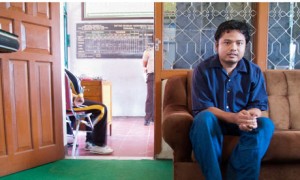 Alexander Aan has been imprisoned for 30 months for posting “God doesn’t exist” on Facebook. This is described by Amnesty International as “a serious setback for freedom of expression in Indonesia,”.
Alexander Aan has been imprisoned for 30 months for posting “God doesn’t exist” on Facebook. This is described by Amnesty International as “a serious setback for freedom of expression in Indonesia,”.
Tempted to think, “Oh, that is just about non-belief, but I’m a believer, so I’ll be OK”. Well, you might like to think again. There is a story in the Guardian last may in which they note that …
…citizens are technically guaranteed freedom ofreligion but protected by law only if they believe in one of six credos: Islam, Catholicism, Protestantism, Buddhism, Confucianism and Hinduism. Those who question any of those face five years in prison for “insulting a major religion”, plus an additional six years if they use the internet to spread such “blasphemy” to others.
So from the viewpoint of the state in Indonesia, they are mandating that you must believe one of six specific beliefs only and that nothing else is acceptable. This has made life miserable for Mr Aan …
From the medium-security rural prison where he has been held for the past two months, Aan has little hope for the future. He has been beaten by angry mobs, rejected by his community and endured public calls for his beheading.
OK, so far nothing I’ve said is unknown or new, so where am I going with this? Well, the core problem is that Indonesia is increasingly being influenced politically and financially by conservative Wahhabi clerics from the Middle East, particularly Saudi Arabia, who help to incite intolerance in Indonesia. According to Andreas Harsono, a local human rights activist …
“Victims keep getting longer prison terms and perpetrators less, while the human rights we set in place 10 years ago are becoming unravelled,” he says. “We’re seeing a motion to ban mini-skirts in government buildings whereas [before] it was OK. Beauty queen contests were OK’d in the 1970s but have been banned in some provinces, while Valentine’s Day celebrations were given the green light 30 years ago but this year were banned in Aceh.
“The situation is getting crazy,” Harsono continues. “We used to discuss these issues. Now there is no discussion. The discourse today is ‘This is un-Islamic and immoral’.”
This is not just about one individual non-believer going to jail, what has happened to Mr Aan is just the tip of the iceberg. You have complete religious lunatics such as the Padang clan chief, Zainuddin Datuk Rajo Lenggang, who claims, “If you are not a religious person, you might be dangerous to others, behaving without control and doing anything you like,”. Daft of course because he is quite clearly the source of extreme danger to others and is himself behaving without control, and can inflict misery and death without being held accountable. The target here is not just non-belief, Christians also suffer greatly, with thousands of congregations facing harassment from these Islamic lunatics. They might indeed truly believe they have a god on their side and are striving for a peaceful society, but in the end they will simply end up tearing their culture apart. Every time a belief attempts to impose itself by force the result will be a harvest of considerable social disorder at best, but may even lead to outright civil war.
Martin Niemöller was a German pastor and theologian born in Lippstadt, Germany, in 1892. Niemöller was an anti-Communist and supported Hitler’s rise to power at first. But when Hitler insisted on the supremacy of the state over religion, Niemöller became disillusioned.
First they came for the communists,
and I didn’t speak out because I wasn’t a communist.Then they came for the trade unionists,
and I didn’t speak out because I wasn’t a trade unionist.Then they came for the Jews,
and I didn’t speak out because I wasn’t a Jew.Then they came for me
and there was no one left to speak out for me.
His words were not abstract or poetical, he ended up in Dachau concentration camp.
As for Mr Aan, he has issued a public apology for his Facebook message and has since converted to Islam, but it all makes no difference, the hardline Islamic Society Forum has called for the use of the death penalty in his case.
He looks out the window to where a group of inmates are celebrating their Sunday by performing karoake to drum’n’bass in the dusty prison yard, most of them smoking, all of them barefoot. “I only want to see a better world and help create a better world,” he says. “If I cannot … then I would prefer to die.”